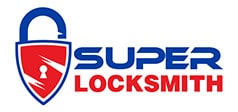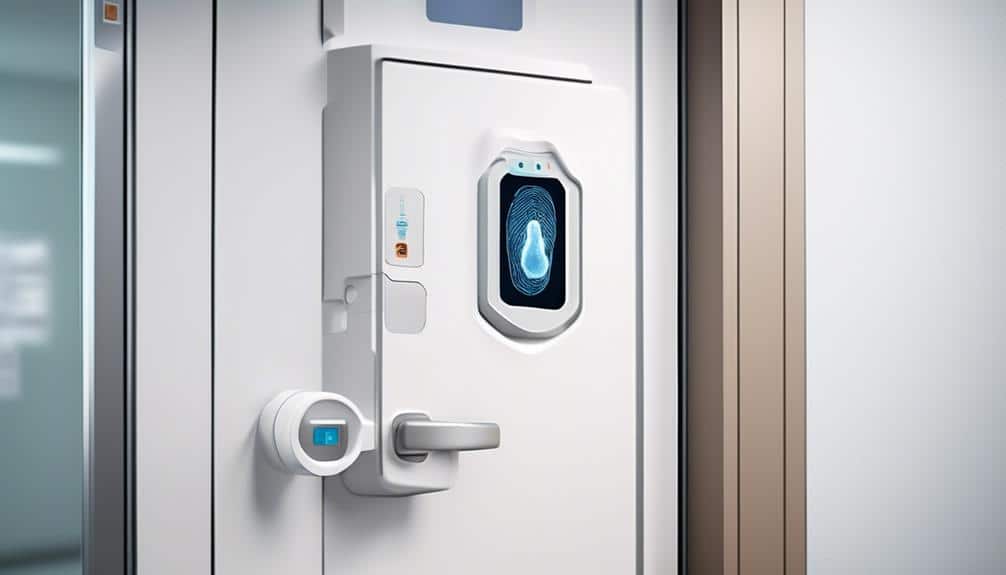Step through the doors of a medical facility, and you enter a world of healing, hope, and vulnerability. The lives of countless individuals are entrusted to the care of healthcare professionals within these walls. But what about the security of these facilities?
How can you ensure the safety of patients, staff, and sensitive information? In this discussion, we will explore the essential lockout solutions that are crucial for safeguarding medical facilities.
From emergency lockout services to specialized locksmith solutions tailored for healthcare settings, we will delve into the key considerations and best practices that can help you protect what matters most.
So, let's unlock the door to a more secure future for medical facilities together.
Emergency Lockout Services for Medical Facilities
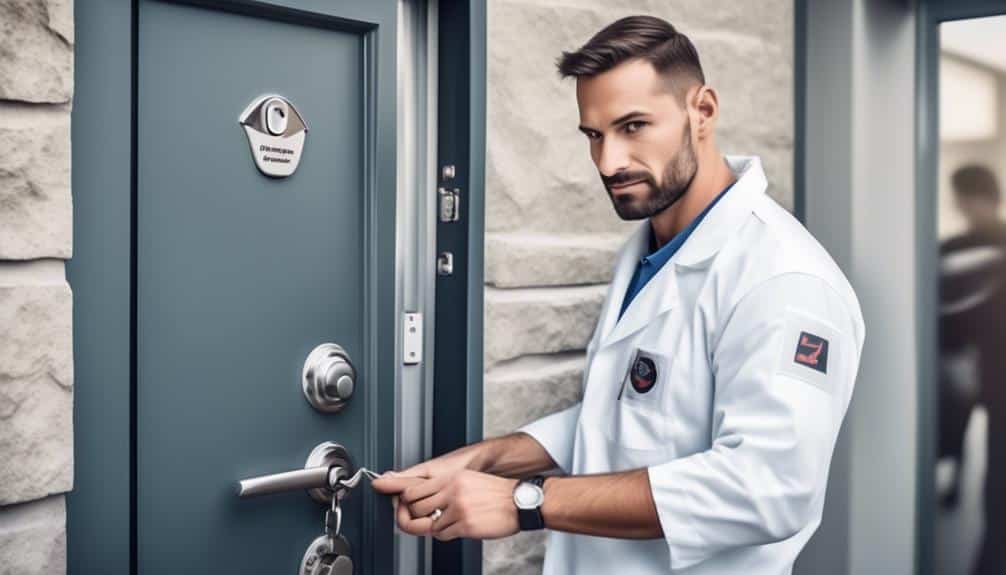
If you find yourself locked out of a medical facility during an emergency situation, it's crucial to have access to reliable emergency lockout services. Medical facilities must have effective emergency lockout response plans in place to ensure the safety and security of patients, staff, and sensitive information. These security measures are designed to prevent unauthorized access, protect valuable assets, and maintain the integrity of the facility.
Emergency lockout response is a critical component of the overall security strategy for medical facilities. When a lockout situation occurs, trained professionals are deployed to quickly assess the situation and provide immediate assistance. These professionals possess the necessary skills and tools to swiftly unlock doors, allowing authorized personnel to regain entry and resume essential operations.
In addition to the emergency lockout response, medical facilities should also implement a range of security measures to minimize the risk of lockouts. This includes using advanced access control systems, such as keycards or biometric scanners, to restrict entry to authorized individuals. Regular maintenance and inspection of locks and doors are also essential to identify and address any potential issues before they lead to lockouts.
Benefits of Professional Lockout Solutions
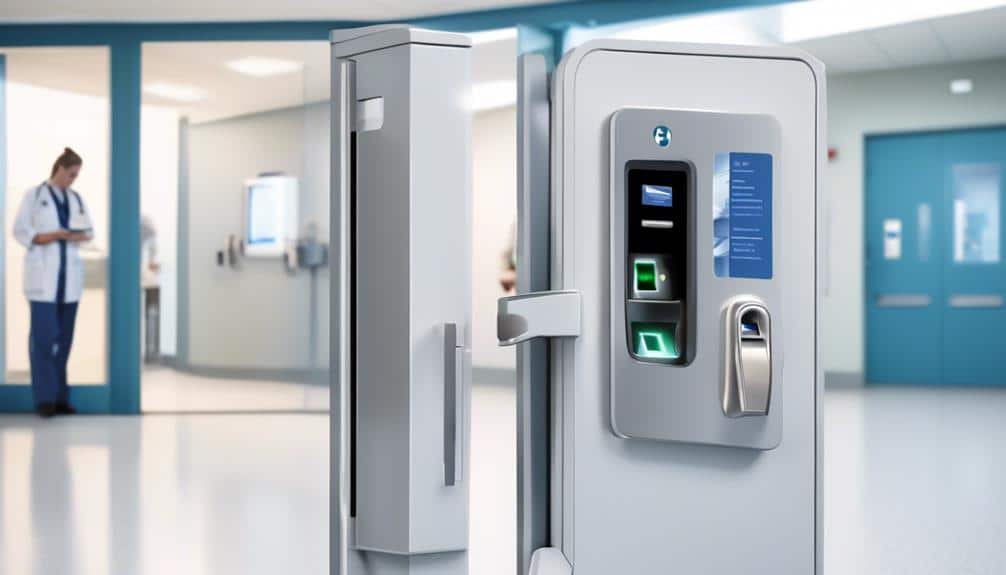
Professional lockout solutions offer a wide range of benefits for medical facilities, ensuring efficient and secure access during emergency situations. Here are four key advantages of outsourcing lockout solutions:
- Enhanced Security: Professional lockout solutions provide advanced security features to protect medical facilities from unauthorized access. These solutions include high-quality locks, access control systems, and surveillance cameras, ensuring the safety of patients, staff, and valuable equipment.
- Cost Effectiveness: By outsourcing lockout solutions, medical facilities can save on upfront costs associated with purchasing and maintaining security equipment. Additionally, professional solutions offer cost-effective maintenance plans, reducing the need for in-house security staff and minimizing long-term expenses.
- Efficiency: Professional lockout solutions streamline the access process, allowing authorized personnel to quickly enter and exit restricted areas. This saves time and improves operational efficiency, especially during emergency situations when every second counts.
- Expertise and Support: By partnering with a professional lockout solution provider, medical facilities gain access to expert knowledge and support. These providers are experienced in implementing and maintaining security systems, ensuring that the facility remains up to date with the latest security measures.
Types of Lockout Situations in Medical Facilities
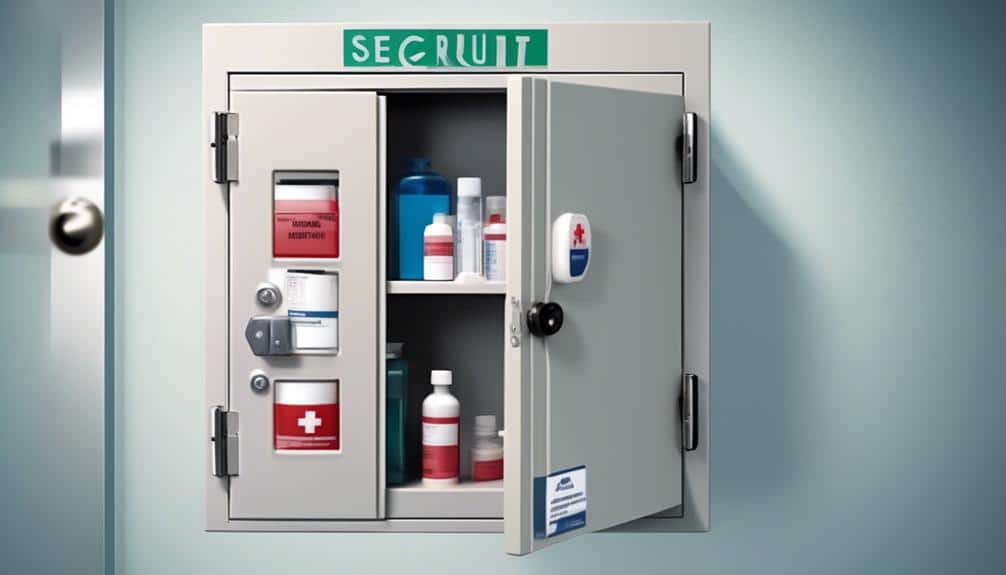
When it comes to lockout situations in medical facilities, there are three key areas to consider:
- Access control systems: Access control systems play a crucial role in preventing unauthorized entry and ensuring the safety of patients and staff.
- Staff training protocols: Staff training protocols should include lockout procedures and guidelines to ensure that everyone knows what to do in case of an emergency.
- Emergency lockout procedures: Having well-defined emergency lockout procedures in place will help minimize risks and respond effectively to potential threats or incidents.
These three areas are essential for maintaining the security and safety of medical facilities.
Access Control Systems
Access control systems play a crucial role in ensuring the security and safety of medical facilities. They prevent unauthorized access and mitigate potential lockout situations. These systems utilize cutting-edge access control technology and keyless entry systems, providing a secure and efficient way to manage facility access.
Here are four key features and benefits of access control systems:
- User authentication: Access control systems require individuals to verify their identity through various methods such as key cards, PIN codes, or biometric scans. This ensures that only authorized personnel can enter restricted areas.
- Centralized control: These systems offer centralized control and management, allowing administrators to monitor and control access to different areas of the facility remotely.
- Audit trails: Access control systems maintain detailed logs of all access events. This provides a comprehensive record of who entered specific areas and when, aiding in investigations or audits.
- Emergency lockdown capabilities: In the event of an emergency, access control systems can quickly initiate a facility-wide lockdown. This restricts access and ensures the safety of staff and patients.
Staff Training Protocols
To ensure the security and safety of medical facilities, staff training protocols must address the various types of lockout situations that can occur. Staff training effectiveness plays a crucial role in preventing common lockout mistakes that could compromise the security of the facility.
Effective training protocols should cover the proper procedures for responding to lockout situations, including identifying potential threats and implementing appropriate security measures. Staff should be trained on how to effectively use access control systems and other security devices to prevent unauthorized access.
Additionally, training should emphasize the importance of remaining vigilant and reporting any suspicious activities or individuals. Regular drills and exercises can help reinforce staff training and ensure that all employees are prepared to handle lockout situations efficiently.
Emergency Lockout Procedures
In emergency lockout situations that may arise in medical facilities, it's essential to have efficient procedures in place to ensure the security and safety of patients, staff, and sensitive information. Here are some key emergency lockout procedures to consider:
- Implement a clear and concise emergency lockout plan that outlines the steps to be taken in various scenarios, such as a lockdown due to an active shooter or a natural disaster.
- Train staff on emergency lockout procedures regularly to ensure everyone is well-prepared and knows their roles and responsibilities.
- Establish communication protocols to quickly alert all personnel about the lockout situation and provide real-time updates.
- Partner with reliable emergency lockout services that can provide immediate assistance in case of a security breach or lockout.
Importance of Quick Response Time in Lockout Emergencies
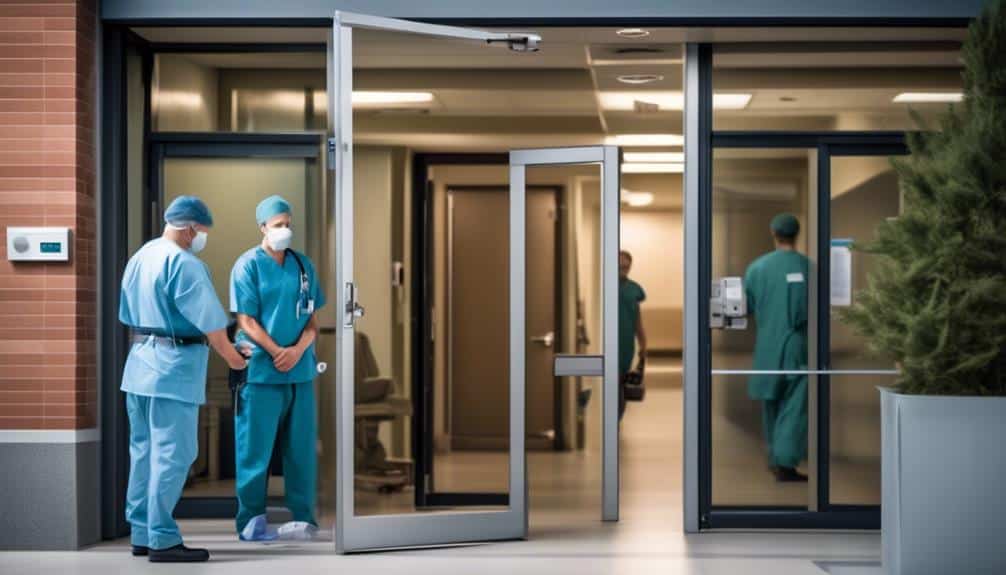
Quick response time is crucial in lockout emergencies to ensure the safety and security of medical facilities. In emergency situations, every second counts, and a quick response can mean the difference between preventing a potential disaster or allowing it to escalate. The benefits of a quick response are manifold. Firstly, it allows for immediate containment of the situation, minimizing any potential damage or harm. Secondly, it enables swift access to the affected area, allowing for prompt resolution of the issue. Lastly, a quick response helps to instill confidence and reassurance among staff, patients, and visitors, as they can trust that the facility is well-prepared to handle emergencies effectively.
To emphasize the importance of quick response time, let's compare the outcomes of two scenarios: one with a fast response and another with a delayed response.
| Quick Response Time | Delayed Response Time |
|---|---|
| Immediate containment of the situation | Escalation of the emergency |
| Prompt resolution of the issue | Prolonged disruption to normal operations |
| Instills confidence and reassurance | Heightened anxiety and fear among stakeholders |
Clearly, a quick response time is essential for preventing emergencies from spiraling out of control. Medical facilities should prioritize implementing efficient lockout solutions and establishing well-trained response teams to ensure the safety and security of all.
Key Considerations for Choosing a Locksmith Service
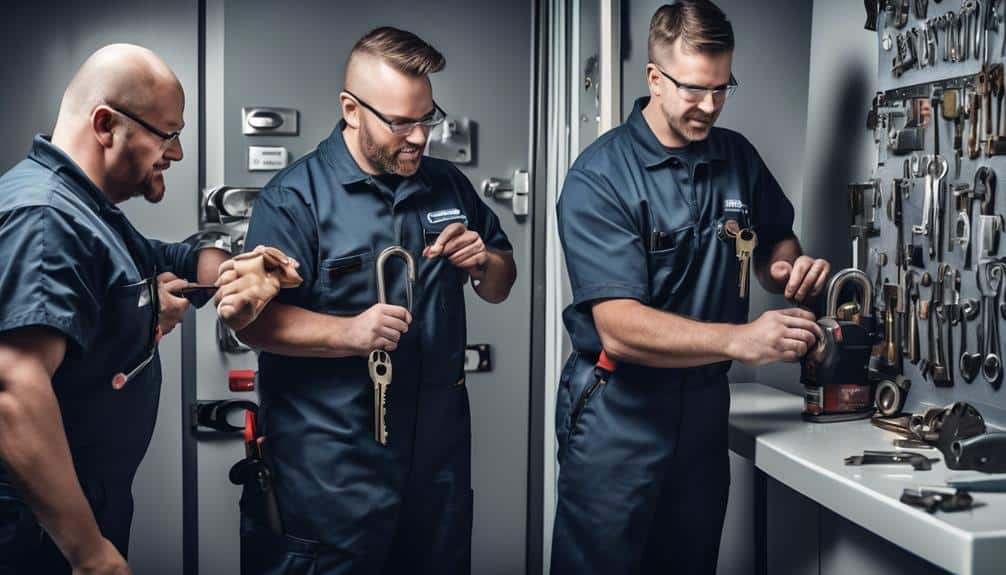
When choosing a locksmith service for your medical facility, there are key considerations to keep in mind.
First and foremost, expertise in different types of lock systems is crucial to ensure that the locksmith can effectively address any lockout situation.
Additionally, the locksmith should offer emergency lockout services to ensure a quick response in case of an urgent situation.
Expertise in Lock Systems
To ensure the security of your medical facility, it's crucial to carefully consider the locksmith service's expertise in lock systems. When choosing a locksmith, look for these key qualifications:
- Extensive experience in lock installation: Ensure the locksmith has a proven track record of successfully installing and maintaining different types of locks commonly used in medical facilities.
- Knowledge of advanced lock technologies: Look for a locksmith who's familiar with the latest advancements in lock systems, such as electronic access control and biometric locks, to provide you with the most secure options.
- Understanding of lockout prevention strategies: A reliable locksmith shouldn't only be able to install locks but also provide valuable insights on preventing lockouts, such as implementing key management procedures and master key systems.
- 24/7 availability: Emergencies can happen at any time, so it's essential to choose a locksmith service that offers round-the-clock assistance to promptly address any lock-related issues that may arise.
Emergency Lockout Services
Consider the following key considerations when choosing a locksmith service for emergency lockout services.
One crucial factor to evaluate is their emergency lockout prevention measures. A reliable locksmith service should have robust security protocols in place to minimize the occurrence of emergency lockouts. This can include regular maintenance and inspections of locking systems to identify and address any potential issues before they escalate.
Another vital aspect to consider is the emergency lockout response time. Time is of the essence in emergency situations, and a locksmith service should be able to provide a rapid response to minimize downtime and ensure the security of the facility. It's essential to inquire about their average response time and their availability during non-business hours, as emergencies can happen at any time.
Specialized Lockout Solutions for Healthcare Settings
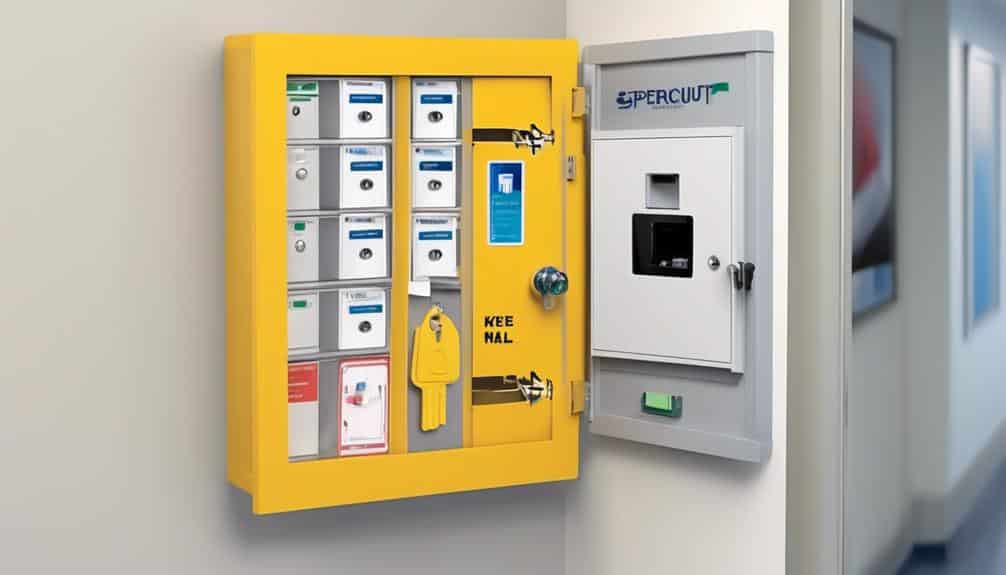
Lockout solutions specifically designed for healthcare settings offer specialized features to ensure the safety and security of medical facilities. These solutions incorporate advanced security measures and lockout prevention strategies to protect against unauthorized access and potential threats.
Here are four key features of specialized lockout solutions for healthcare settings:
- Access control systems: These systems use technologies like key cards or biometric authentication to restrict entry to authorized personnel only. They provide a comprehensive solution for managing access to different areas within the facility, ensuring that sensitive areas are protected.
- Video surveillance: Integrated video surveillance systems enable continuous monitoring of the facility, deterring potential intruders and providing evidence in case of security breaches. High-resolution cameras and intelligent analytics enhance the effectiveness of the surveillance system.
- Alarm systems: Advanced alarm systems with sensors and detectors can detect unauthorized access or intrusions, triggering alarms and notifications to security personnel. These systems help in quickly identifying and responding to security threats.
- Remote monitoring and control: Specialized lockout solutions allow for remote monitoring and control of access systems, surveillance cameras, and alarms. This feature enables security personnel to monitor the facility from a central location and respond to any security issues promptly.
Best Practices for Preventing Lockouts in Medical Facilities
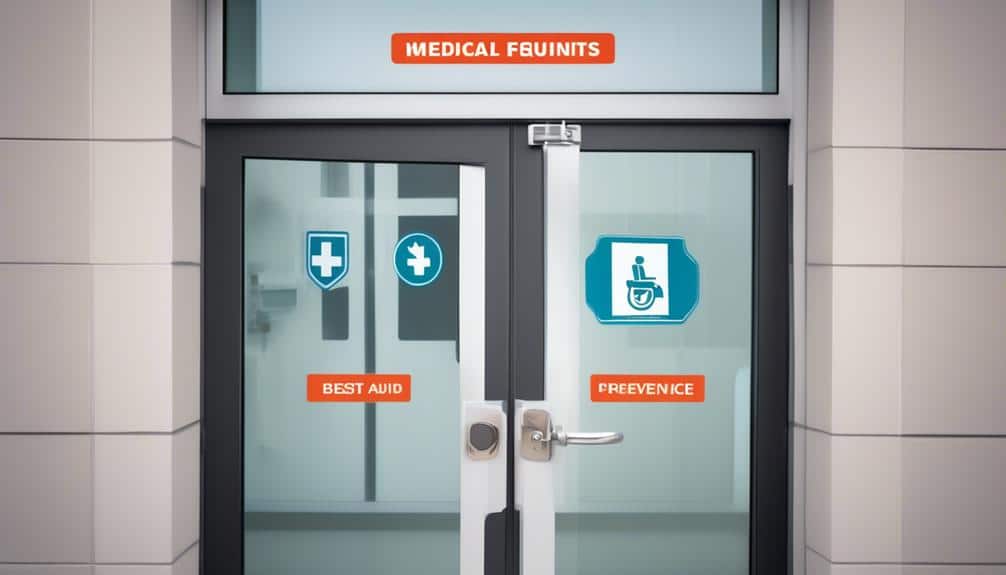
Implementing effective security protocols is crucial for preventing lockouts in medical facilities. By following best practices and implementing proper security measures, you can minimize the risk of emergency lockouts and ensure the safety and efficiency of your facility. Here are some key practices to consider:
| Best Practices for Preventing Lockouts | Description | Benefits |
|---|---|---|
| Conduct regular security audits | Evaluate the effectiveness of existing protocols | Identify vulnerabilities and make necessary improvements |
| Develop a comprehensive access control system | Implement electronic keycards or biometric systems | Restrict access to authorized personnel, reducing the risk of unauthorized entry |
| Implement a clear lockout policy | Provide guidelines for staff during emergency situations | Ensure everyone understands their roles and responsibilities, minimizing confusion and potential lockouts |
| Train staff on lockout prevention procedures | Educate employees on proper security protocols | Empower staff to handle potential lockout situations effectively, mitigating risks and minimizing downtime |
Frequently Asked Questions
How Can I Prevent Lockouts in Medical Facilities?
To prevent lockouts in medical facilities, you need to implement preventive measures and effective access control systems. By doing so, you can ensure the safety and security of both staff and patients.
One interesting statistic to consider is that 30% of medical facility lockouts are caused by lost or stolen keys. To address this issue, consider upgrading to keyless entry systems or implementing biometric authentication.
These measures will significantly reduce the risk of lockouts and unauthorized access.
What Are Some Key Factors to Consider When Choosing a Locksmith Service for Medical Facilities?
When choosing a locksmith service for medical facilities, there are key factors you should consider.
First, ensure that the locksmith specializes in commercial security systems, specifically for medical facilities.
Look for a service that offers 24/7 emergency response and quick turnaround times.
It's also important to verify that the locksmith is licensed, insured, and has a good reputation in the industry.
Are There Any Specialized Lockout Solutions Specifically Designed for Healthcare Settings?
When it comes to healthcare lockout systems, specialized lockout solutions are available to ensure the security of medical facilities. These solutions are specifically designed to meet the unique needs of healthcare settings, providing enhanced security measures to protect sensitive patient information and valuable medical equipment.
With these specialized lockout solutions in place, you can have peace of mind knowing that your medical facility is well-protected against unauthorized access and potential security breaches.
Why Is Quick Response Time Important in Lockout Emergencies in Medical Facilities?
Quick response time is crucial in lockout emergencies in medical facilities due to the importance of ensuring the safety and security of patients, staff, and sensitive equipment. In these critical situations, every second counts and delays can have severe consequences.
A prompt response allows for immediate intervention, minimizing the potential for harm or unauthorized access. Maintaining a rapid and efficient lockout response system is essential for safeguarding the well-being and confidentiality of everyone within the medical facility.
What Are the Benefits of Professional Lockout Solutions for Medical Facilities?
Advantages of professional lockout solutions for medical facilities are numerous.
These solutions provide a higher level of security, ensuring the safety of both staff and patients.
They also offer convenience and ease of use, allowing authorized personnel to access restricted areas quickly and efficiently.
The importance of these solutions can't be overstated, as they help prevent unauthorized access, reduce the risk of theft or tampering, and maintain the confidentiality of sensitive information.
Trusting professionals for lockout solutions is a wise choice.
